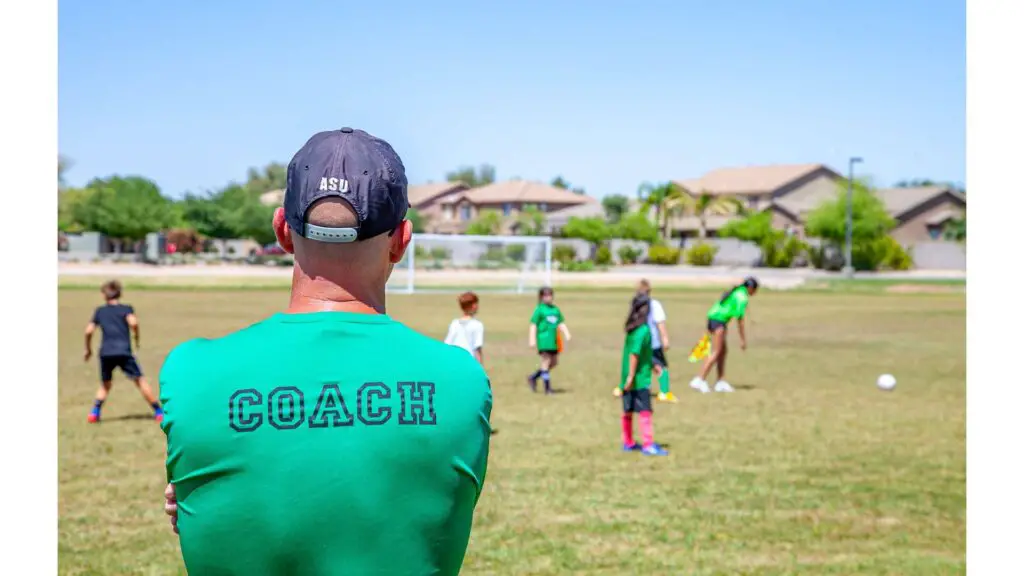As a soccer enthusiast, you may be wondering how you can continue playing your favourite sport at the collegiate level.
Playing soccer in college is a dream for many young athletes, but it requires dedication, hard work, and careful planning.
In this article, we will provide you with a comprehensive guide on how to play soccer in college, from researching college soccer programs to tryouts and beyond.
Let’s get started.
How to Play Soccer in College?
To learn how to play soccer in college, you can follow these steps:
- Research college soccer programs: Look for colleges that offer soccer programs and review their requirements and eligibility criteria for joining the team.
- Train and prepare: Train and prepare yourself physically and mentally for college-level soccer by improving your skills, endurance, and agility.
- Attend soccer camps or clinics: Attend soccer camps or clinics to further improve your skills and gain exposure to college coaches.
- Attend college soccer recruitment events: Attend college soccer recruitment events such as showcases or ID camps to showcase your skills to college coaches.
- Contact college coaches: Reach out to college coaches and express your interest in their program. Share your soccer resume, highlight videos, and other relevant information.
- Stay academically eligible: Maintain good academic standing to remain eligible to play soccer in college.
- Try out for the team: Participate in tryouts for the soccer team at your desired college and work hard to showcase your skills and abilities.
- Embrace the team culture: Once you join the soccer team, embrace the team culture, and work hard to contribute to the team’s success both on and off the field.
1. Research College Soccer Programs
The first step to playing soccer in college is to research college soccer programs that you may be interested in.
You can start by visiting your college websites and looking for information about their soccer programs. Look for details such as the number of players on the team, team accomplishments, coaching staff, and team culture.
It is important to note that there are different levels of college soccer programs, including NCAA Division I, II, and III, as well as NAIA and Junior College programs.
Each level has its requirements and eligibility criteria, so try to understand these differences when researching college soccer programs.
2. Train and Prepare

Once you have identified college soccer programs that interest you, it’s time to start training and preparing yourself for the college level. This includes improving your technical skills, physical fitness, and mental toughness.
One of the best ways to improve your soccer skills is to work with a coach. This will allow you to learn new skills and techniques, as well as receive feedback on your performance. You can also train on your own by practising ball control, shooting, passing, and other soccer drills.
Physical fitness is also crucial for playing soccer in college. You should focus on improving your speed, agility, endurance, and strength through regular exercise and conditioning. This includes running, weight training, and plyometrics exercises.
Mental toughness is equally important for college-level soccer. You should work on developing your focus, determination, and confidence. This can be achieved through visualization, meditation, and positive self-talk.
3. Attend Soccer Camps or Clinics
Attending soccer camps or clinics is a great way to gain exposure to college coaches and improve your skills. These events provide an opportunity to work with experienced coaches and learn from other players.
When choosing a soccer camp or clinic, look for events that are specific to your age group and skill level.
You should also research the coaches and staff to ensure that they have the experience and credentials to help you achieve your goals.
Note that all country colleges don’t have soccer camps. So, it’s not a big deal if colleges in your country don’t do it.
4. Attend College Soccer Recruitment Events

College soccer recruitment events such as showcases or ID camps are specifically designed for college coaches to evaluate potential players.
These events provide an opportunity for players to showcase their skills and abilities in front of college coaches.
Before attending a recruitment event, prepare a soccer resume and highlight video.
These documents should highlight your achievements, skills, and experience.
You should also reach out to coaches before the event to express your interest and provide them with your information.
5. Contact College Coaches
Reaching out to college coaches is an important step in the college soccer recruitment process. Coaches receive many inquiries from potential players, so it’s important to make a good first impression.
When contacting coaches, be professional and concise.
Introduce yourself, express your interest in their program, and provide them with your soccer resume and highlight video.
You should also ask them about their program and what they are looking for in a player.
6. Stay Academically Eligible

In addition to being a skilled soccer player, you must also maintain good academic standing to be eligible to play soccer in college.
Each college has its academic eligibility requirements, so you have to understand these requirements and stay on top of your studies.
To stay academically eligible, you should attend all classes, complete all assignments, and maintain good grades.
You should also communicate with your professors and academic advisors if you are struggling academically or need additional support.
7. Try Out for the Team
Once you have identified college soccer programs that interest you and have prepared yourself for college-level soccer, it’s time to try out for the team. Tryouts provide an opportunity to showcase your skills and abilities in front of the coaching staff.
Before tryouts, make sure that you are familiar with the team’s playing style and strategies. You should also arrive early to the tryout, dress appropriately, and bring all necessary equipment.
During the tryout, focus on giving your best effort and demonstrating your skills. Be coachable, open to feedback, and show that you are a team player.
8. Embrace the Team Culture
If you are selected to join a college soccer team, it’s important to embrace the team culture and work hard to contribute to the team’s success both on and off the field.
This includes attending team practices and meetings, communicating with your coaches and teammates, and maintaining a positive attitude.
You should also focus on developing strong relationships with your teammates and coaches. This includes showing respect, being a good listener, and offering support when needed.
Frequently Asked Questions(FAQ)
Can I start playing soccer in college?
Yes, it is possible to start playing soccer in college. However, it’s important to research college soccer programs, train and prepare yourself, attend soccer camps, attend college soccer recruitment events, contact college coaches, stay academically eligible, try out for the team, and embrace the team culture to increase your chances of being selected to play on a college soccer team.
Is it hard to get into college soccer?
Getting into college soccer can be challenging, as college coaches typically look for skilled and experienced players who can contribute to the team’s success both on and off the field. However, with dedication, hard work, and careful planning, it is possible to increase your chances of being selected to play on a college soccer team.
Do you try out for college soccer?
Yes, tryouts are typically required for college soccer teams. This provides an opportunity for players to showcase their skills and abilities in front of the coaching staff, who then make decisions about which players will be selected to join the team. It’s important to prepare yourself before the tryouts by researching the team’s playing style and strategies, arriving early, dressing appropriately, and bringing all necessary equipment. During the tryout, focus on giving your best effort and demonstrating your skills, being coachable, open to feedback, and showing that you are a team player.
Is there an age limit for college soccer?
There is no specific age limit for college soccer, but most college soccer players are between 18 and 23 years old. College soccer teams are typically made up of students who are currently enrolled in college or university and are pursuing an undergraduate or graduate degree. However, some college soccer programs may have age or eligibility requirements, such as limiting the number of years that a player can participate in college sports. It’s important to research the specific requirements of each college soccer program to determine if you are eligible to participate.
Do college soccer players go pro?
Yes, some college soccer players may go on to play professionally after they finished school. Playing college soccer can provide valuable experience and exposure for players who are interested in pursuing a career in professional soccer. Many college soccer players are scouted by professional teams and may receive offers to play professionally after graduation. However, becoming a professional soccer player requires a high level of skill, dedication, and hard work, and not all college soccer players will go on to play professionally.
How do colleges recruit soccer players?
Colleges recruit soccer players in a variety of ways, including attending high school games, scouting at soccer tournaments and showcases, and receiving recommendations from coaches, teammates, or other contacts in the soccer community. College soccer coaches may also use online recruiting services, such as NCSA or BeRecruited, to find potential players. Additionally, some college soccer programs may hold recruitment events or invite prospective players to attend training sessions or camps on campus.
Final Thoughts
Playing soccer in college requires dedication, hard work, and careful planning.
To play soccer in college, you should research college soccer programs, train and prepare yourself, attend soccer camps and clinics, attend college soccer recruitment events, contact college coaches, stay academically eligible, try out for the team, and embrace the team culture.
With perseverance and a love for the game, you can achieve your dream of playing soccer at the collegiate level.
You can also read: How to play soccer alone?


